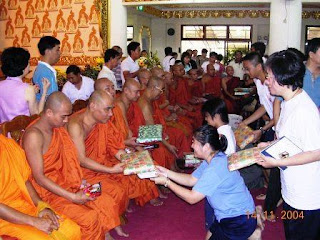Sutra Recitation
Single-mindedly chanting a sutra without wandering thoughts, distractions or doubt, this is called cultivating meditative concentration. From the beginning till the end, enunciating clearly every word without error or omission - this is cultivating wisdom, we call it fundamental wisdom.
Thus, chanting a sutra is cultivating simultaneously the precepts, meditative concentration and wisdom. If one thinks about the meaning of the sutra while chanting it will ruin the cultivation of precept observation, meditative concentration and wisdom. This is treating the sutra as a worldly book.
A Living Buddha Zhangjia once said: Buddhism does not emphasize on forms or rituals but rather true substance. If we pay attention only to the formality and fail profoundly comprehend the essence of the sutra's teaching, we will not progress any further than just being zealous about our faith and thus be easily manipulated by those with bad intentions.
Chanting the sutras is cultivating the precepts, cultivating meditative concentration and cultivating wisdom. When chanting a sutra, one simply reads the words, without thinking of their meaning. Chanting sincerely this way is cultivating the precepts, meditative concentration and wisdom.
The sutras are to be recited daily but not for the benefit of the Buddha. We recite them as another reminder of how to cultivate our mind and how to properly interact with others and circumstances. For example, our daily conduct is an expression of the Infinite Life Sutra when we emulate the qualities found within it.
Sutras flow from the pure and quiet mind of the Buddha. when we develop a mind as pure and quiet, we will understand all we read in a sutra. The reason why a sutra is so hard to understand now is that our minds are filled with wandering thoughts. How can this mind be in harmony with one that is pure and quiet?
This is why we do not understand the Buddha's words. So, if we want to learn from a good teacher, we need to trust and believe that their methods are proper and correct.
Thus, chanting a sutra is cultivating simultaneously the precepts, meditative concentration and wisdom. If one thinks about the meaning of the sutra while chanting it will ruin the cultivation of precept observation, meditative concentration and wisdom. This is treating the sutra as a worldly book.
A Living Buddha Zhangjia once said: Buddhism does not emphasize on forms or rituals but rather true substance. If we pay attention only to the formality and fail profoundly comprehend the essence of the sutra's teaching, we will not progress any further than just being zealous about our faith and thus be easily manipulated by those with bad intentions.
Chanting the sutras is cultivating the precepts, cultivating meditative concentration and cultivating wisdom. When chanting a sutra, one simply reads the words, without thinking of their meaning. Chanting sincerely this way is cultivating the precepts, meditative concentration and wisdom.
The sutras are to be recited daily but not for the benefit of the Buddha. We recite them as another reminder of how to cultivate our mind and how to properly interact with others and circumstances. For example, our daily conduct is an expression of the Infinite Life Sutra when we emulate the qualities found within it.
Sutras flow from the pure and quiet mind of the Buddha. when we develop a mind as pure and quiet, we will understand all we read in a sutra. The reason why a sutra is so hard to understand now is that our minds are filled with wandering thoughts. How can this mind be in harmony with one that is pure and quiet?
This is why we do not understand the Buddha's words. So, if we want to learn from a good teacher, we need to trust and believe that their methods are proper and correct.




Comments